Annotated Bibliography: Service Quality in Tourism Industry MRKT20054
VerifiedAdded on 2023/01/19
|10
|2397
|85
Annotated Bibliography
AI Summary
This annotated bibliography, submitted by a student, examines five research studies published between 2014 and 2019 on service quality within the higher education tourism industry. The introduction and conclusion sections frame the analysis, which focuses on key concepts like the 7Ps of marketing, customer satisfaction, personalized services, and smart tourism. Each entry provides a concise summary of the article's objectives, methodologies, findings, and limitations. The studies explore various aspects, including employee competencies, the role of emotions in service experience, and the impact of technology on customer expectations. The bibliography highlights the evolving nature of the tourism industry and the importance of adapting to customer preferences for enhanced experiences. The conclusion emphasizes the significance of delivering high-quality services and tangible goods to ensure customer satisfaction and a positive hospitality experience. The references section provides full citations for the included articles.
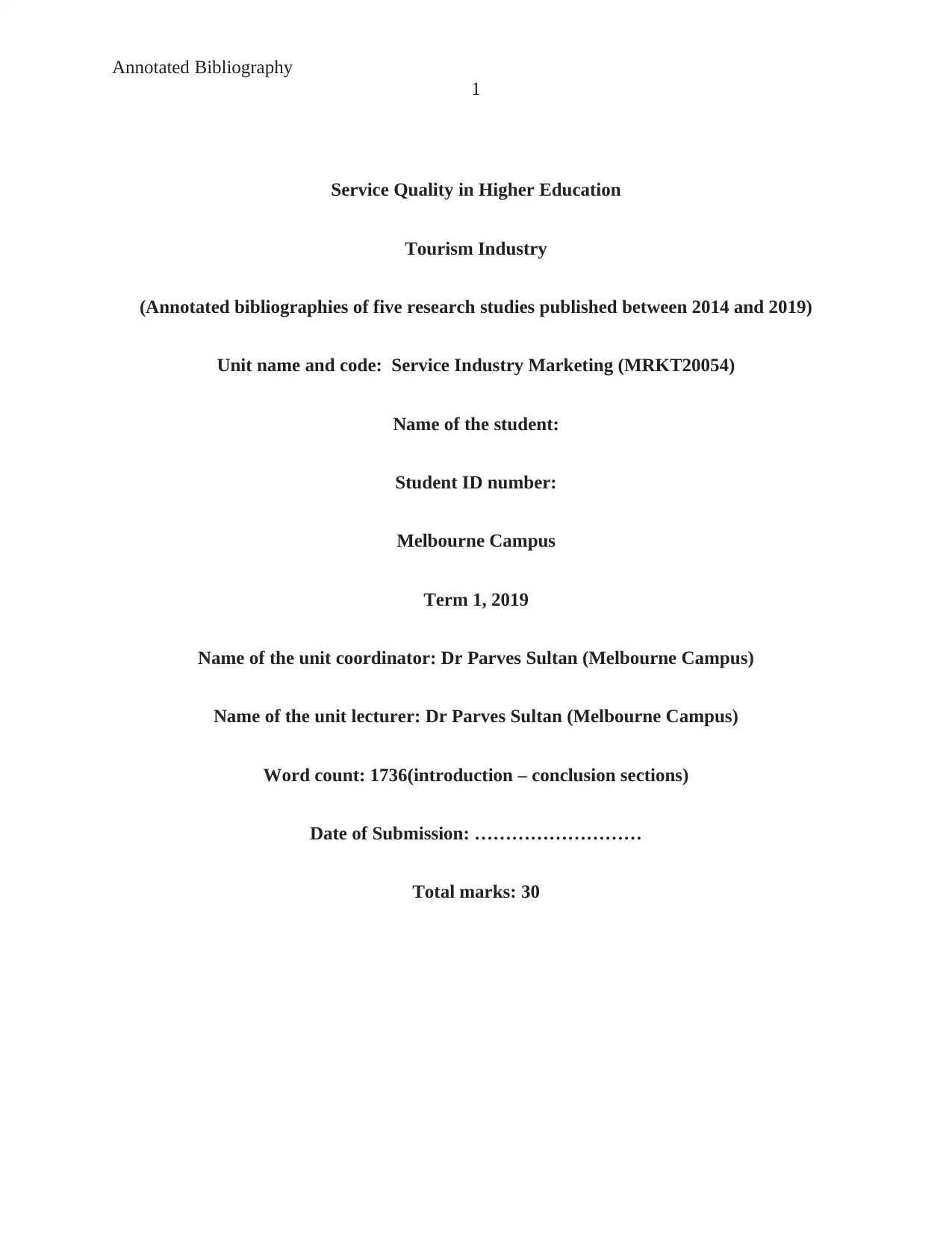
Annotated Bibliography
1
Service Quality in Higher Education
Tourism Industry
(Annotated bibliographies of five research studies published between 2014 and 2019)
Unit name and code: Service Industry Marketing (MRKT20054)
Name of the student:
Student ID number:
Melbourne Campus
Term 1, 2019
Name of the unit coordinator: Dr Parves Sultan (Melbourne Campus)
Name of the unit lecturer: Dr Parves Sultan (Melbourne Campus)
Word count: 1736(introduction – conclusion sections)
Date of Submission: ………………………
Total marks: 30
1
Service Quality in Higher Education
Tourism Industry
(Annotated bibliographies of five research studies published between 2014 and 2019)
Unit name and code: Service Industry Marketing (MRKT20054)
Name of the student:
Student ID number:
Melbourne Campus
Term 1, 2019
Name of the unit coordinator: Dr Parves Sultan (Melbourne Campus)
Name of the unit lecturer: Dr Parves Sultan (Melbourne Campus)
Word count: 1736(introduction – conclusion sections)
Date of Submission: ………………………
Total marks: 30
Paraphrase This Document
Need a fresh take? Get an instant paraphrase of this document with our AI Paraphraser
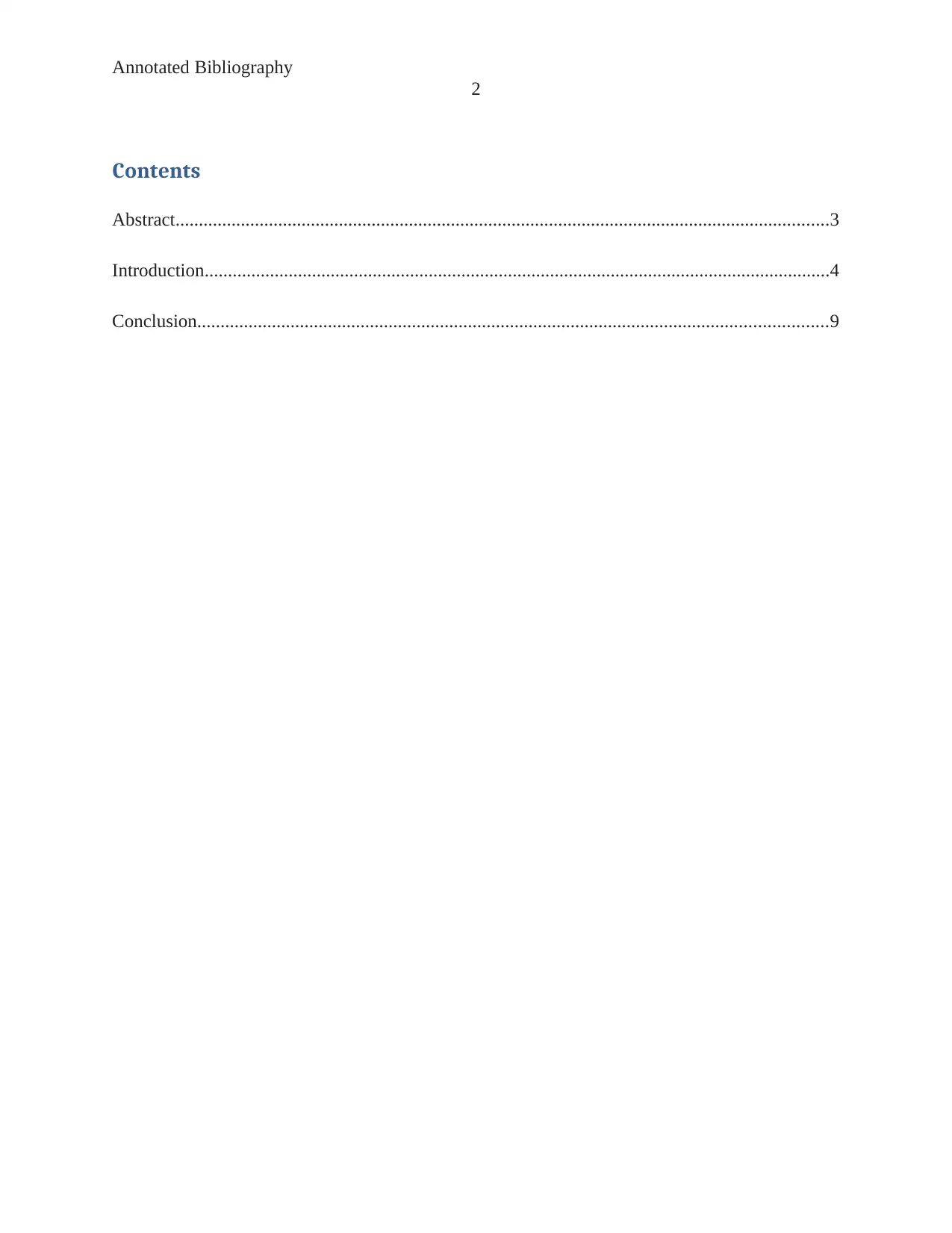
Annotated Bibliography
2
Contents
Abstract............................................................................................................................................3
Introduction......................................................................................................................................4
Conclusion.......................................................................................................................................9
2
Contents
Abstract............................................................................................................................................3
Introduction......................................................................................................................................4
Conclusion.......................................................................................................................................9
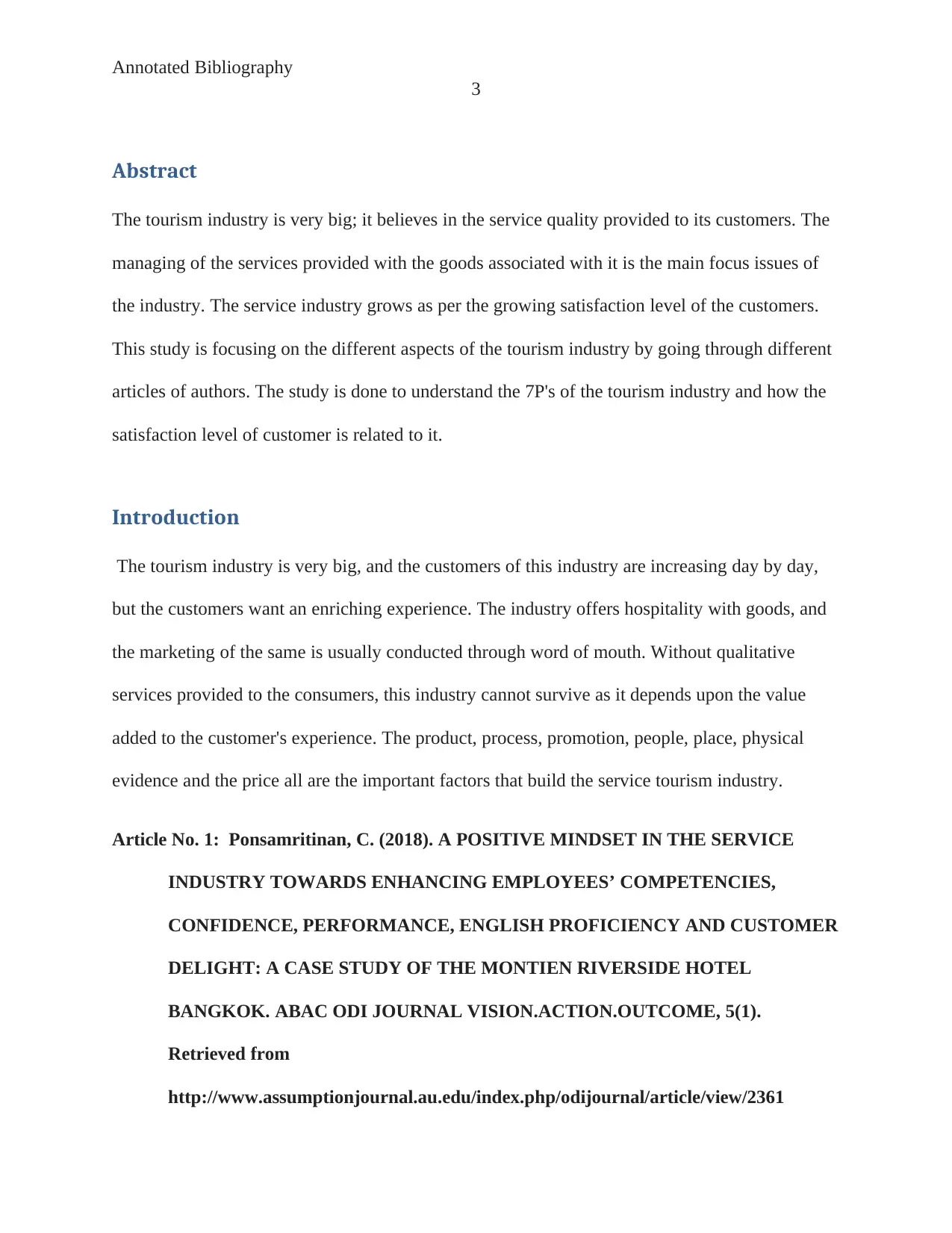
Annotated Bibliography
3
Abstract
The tourism industry is very big; it believes in the service quality provided to its customers. The
managing of the services provided with the goods associated with it is the main focus issues of
the industry. The service industry grows as per the growing satisfaction level of the customers.
This study is focusing on the different aspects of the tourism industry by going through different
articles of authors. The study is done to understand the 7P's of the tourism industry and how the
satisfaction level of customer is related to it.
Introduction
The tourism industry is very big, and the customers of this industry are increasing day by day,
but the customers want an enriching experience. The industry offers hospitality with goods, and
the marketing of the same is usually conducted through word of mouth. Without qualitative
services provided to the consumers, this industry cannot survive as it depends upon the value
added to the customer's experience. The product, process, promotion, people, place, physical
evidence and the price all are the important factors that build the service tourism industry.
Article No. 1: Ponsamritinan, C. (2018). A POSITIVE MINDSET IN THE SERVICE
INDUSTRY TOWARDS ENHANCING EMPLOYEES’ COMPETENCIES,
CONFIDENCE, PERFORMANCE, ENGLISH PROFICIENCY AND CUSTOMER
DELIGHT: A CASE STUDY OF THE MONTIEN RIVERSIDE HOTEL
BANGKOK. ABAC ODI JOURNAL VISION.ACTION.OUTCOME, 5(1).
Retrieved from
http://www.assumptionjournal.au.edu/index.php/odijournal/article/view/2361
3
Abstract
The tourism industry is very big; it believes in the service quality provided to its customers. The
managing of the services provided with the goods associated with it is the main focus issues of
the industry. The service industry grows as per the growing satisfaction level of the customers.
This study is focusing on the different aspects of the tourism industry by going through different
articles of authors. The study is done to understand the 7P's of the tourism industry and how the
satisfaction level of customer is related to it.
Introduction
The tourism industry is very big, and the customers of this industry are increasing day by day,
but the customers want an enriching experience. The industry offers hospitality with goods, and
the marketing of the same is usually conducted through word of mouth. Without qualitative
services provided to the consumers, this industry cannot survive as it depends upon the value
added to the customer's experience. The product, process, promotion, people, place, physical
evidence and the price all are the important factors that build the service tourism industry.
Article No. 1: Ponsamritinan, C. (2018). A POSITIVE MINDSET IN THE SERVICE
INDUSTRY TOWARDS ENHANCING EMPLOYEES’ COMPETENCIES,
CONFIDENCE, PERFORMANCE, ENGLISH PROFICIENCY AND CUSTOMER
DELIGHT: A CASE STUDY OF THE MONTIEN RIVERSIDE HOTEL
BANGKOK. ABAC ODI JOURNAL VISION.ACTION.OUTCOME, 5(1).
Retrieved from
http://www.assumptionjournal.au.edu/index.php/odijournal/article/view/2361
⊘ This is a preview!⊘
Do you want full access?
Subscribe today to unlock all pages.

Trusted by 1+ million students worldwide
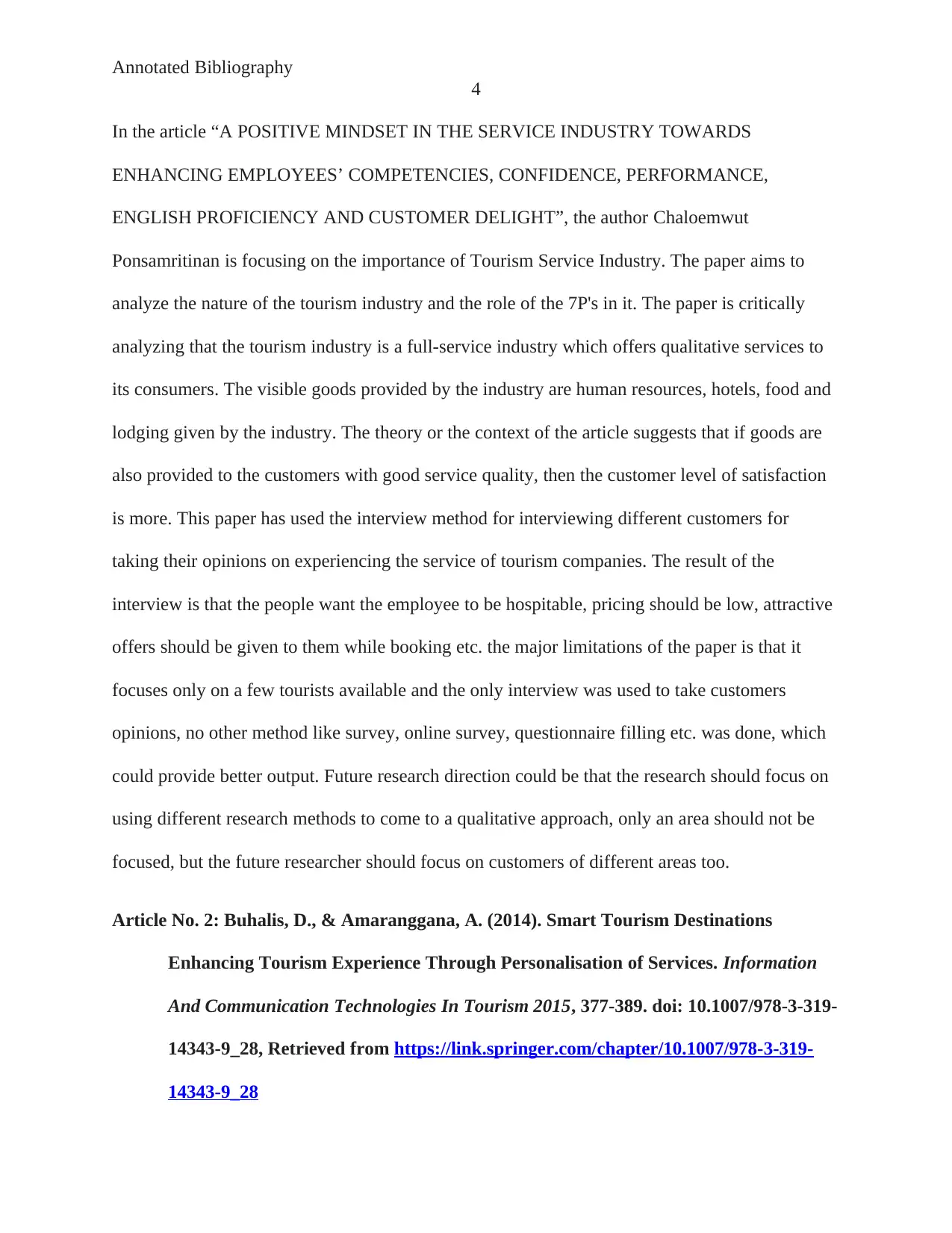
Annotated Bibliography
4
In the article “A POSITIVE MINDSET IN THE SERVICE INDUSTRY TOWARDS
ENHANCING EMPLOYEES’ COMPETENCIES, CONFIDENCE, PERFORMANCE,
ENGLISH PROFICIENCY AND CUSTOMER DELIGHT”, the author Chaloemwut
Ponsamritinan is focusing on the importance of Tourism Service Industry. The paper aims to
analyze the nature of the tourism industry and the role of the 7P's in it. The paper is critically
analyzing that the tourism industry is a full-service industry which offers qualitative services to
its consumers. The visible goods provided by the industry are human resources, hotels, food and
lodging given by the industry. The theory or the context of the article suggests that if goods are
also provided to the customers with good service quality, then the customer level of satisfaction
is more. This paper has used the interview method for interviewing different customers for
taking their opinions on experiencing the service of tourism companies. The result of the
interview is that the people want the employee to be hospitable, pricing should be low, attractive
offers should be given to them while booking etc. the major limitations of the paper is that it
focuses only on a few tourists available and the only interview was used to take customers
opinions, no other method like survey, online survey, questionnaire filling etc. was done, which
could provide better output. Future research direction could be that the research should focus on
using different research methods to come to a qualitative approach, only an area should not be
focused, but the future researcher should focus on customers of different areas too.
Article No. 2: Buhalis, D., & Amaranggana, A. (2014). Smart Tourism Destinations
Enhancing Tourism Experience Through Personalisation of Services. Information
And Communication Technologies In Tourism 2015, 377-389. doi: 10.1007/978-3-319-
14343-9_28, Retrieved from https://link.springer.com/chapter/10.1007/978-3-319-
14343-9_28
4
In the article “A POSITIVE MINDSET IN THE SERVICE INDUSTRY TOWARDS
ENHANCING EMPLOYEES’ COMPETENCIES, CONFIDENCE, PERFORMANCE,
ENGLISH PROFICIENCY AND CUSTOMER DELIGHT”, the author Chaloemwut
Ponsamritinan is focusing on the importance of Tourism Service Industry. The paper aims to
analyze the nature of the tourism industry and the role of the 7P's in it. The paper is critically
analyzing that the tourism industry is a full-service industry which offers qualitative services to
its consumers. The visible goods provided by the industry are human resources, hotels, food and
lodging given by the industry. The theory or the context of the article suggests that if goods are
also provided to the customers with good service quality, then the customer level of satisfaction
is more. This paper has used the interview method for interviewing different customers for
taking their opinions on experiencing the service of tourism companies. The result of the
interview is that the people want the employee to be hospitable, pricing should be low, attractive
offers should be given to them while booking etc. the major limitations of the paper is that it
focuses only on a few tourists available and the only interview was used to take customers
opinions, no other method like survey, online survey, questionnaire filling etc. was done, which
could provide better output. Future research direction could be that the research should focus on
using different research methods to come to a qualitative approach, only an area should not be
focused, but the future researcher should focus on customers of different areas too.
Article No. 2: Buhalis, D., & Amaranggana, A. (2014). Smart Tourism Destinations
Enhancing Tourism Experience Through Personalisation of Services. Information
And Communication Technologies In Tourism 2015, 377-389. doi: 10.1007/978-3-319-
14343-9_28, Retrieved from https://link.springer.com/chapter/10.1007/978-3-319-
14343-9_28
Paraphrase This Document
Need a fresh take? Get an instant paraphrase of this document with our AI Paraphraser
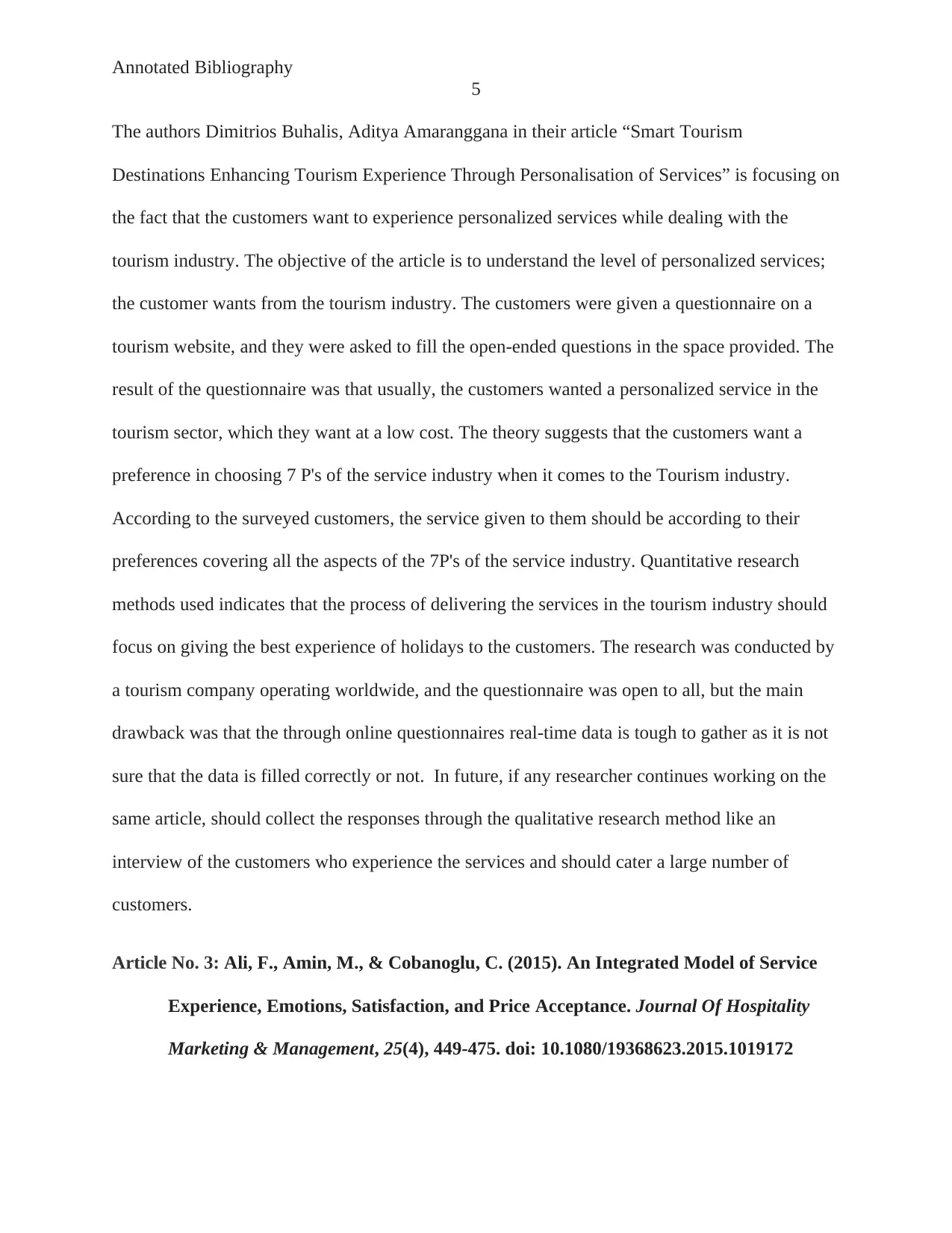
Annotated Bibliography
5
The authors Dimitrios Buhalis, Aditya Amaranggana in their article “Smart Tourism
Destinations Enhancing Tourism Experience Through Personalisation of Services” is focusing on
the fact that the customers want to experience personalized services while dealing with the
tourism industry. The objective of the article is to understand the level of personalized services;
the customer wants from the tourism industry. The customers were given a questionnaire on a
tourism website, and they were asked to fill the open-ended questions in the space provided. The
result of the questionnaire was that usually, the customers wanted a personalized service in the
tourism sector, which they want at a low cost. The theory suggests that the customers want a
preference in choosing 7 P's of the service industry when it comes to the Tourism industry.
According to the surveyed customers, the service given to them should be according to their
preferences covering all the aspects of the 7P's of the service industry. Quantitative research
methods used indicates that the process of delivering the services in the tourism industry should
focus on giving the best experience of holidays to the customers. The research was conducted by
a tourism company operating worldwide, and the questionnaire was open to all, but the main
drawback was that the through online questionnaires real-time data is tough to gather as it is not
sure that the data is filled correctly or not. In future, if any researcher continues working on the
same article, should collect the responses through the qualitative research method like an
interview of the customers who experience the services and should cater a large number of
customers.
Article No. 3: Ali, F., Amin, M., & Cobanoglu, C. (2015). An Integrated Model of Service
Experience, Emotions, Satisfaction, and Price Acceptance. Journal Of Hospitality
Marketing & Management, 25(4), 449-475. doi: 10.1080/19368623.2015.1019172
5
The authors Dimitrios Buhalis, Aditya Amaranggana in their article “Smart Tourism
Destinations Enhancing Tourism Experience Through Personalisation of Services” is focusing on
the fact that the customers want to experience personalized services while dealing with the
tourism industry. The objective of the article is to understand the level of personalized services;
the customer wants from the tourism industry. The customers were given a questionnaire on a
tourism website, and they were asked to fill the open-ended questions in the space provided. The
result of the questionnaire was that usually, the customers wanted a personalized service in the
tourism sector, which they want at a low cost. The theory suggests that the customers want a
preference in choosing 7 P's of the service industry when it comes to the Tourism industry.
According to the surveyed customers, the service given to them should be according to their
preferences covering all the aspects of the 7P's of the service industry. Quantitative research
methods used indicates that the process of delivering the services in the tourism industry should
focus on giving the best experience of holidays to the customers. The research was conducted by
a tourism company operating worldwide, and the questionnaire was open to all, but the main
drawback was that the through online questionnaires real-time data is tough to gather as it is not
sure that the data is filled correctly or not. In future, if any researcher continues working on the
same article, should collect the responses through the qualitative research method like an
interview of the customers who experience the services and should cater a large number of
customers.
Article No. 3: Ali, F., Amin, M., & Cobanoglu, C. (2015). An Integrated Model of Service
Experience, Emotions, Satisfaction, and Price Acceptance. Journal Of Hospitality
Marketing & Management, 25(4), 449-475. doi: 10.1080/19368623.2015.1019172
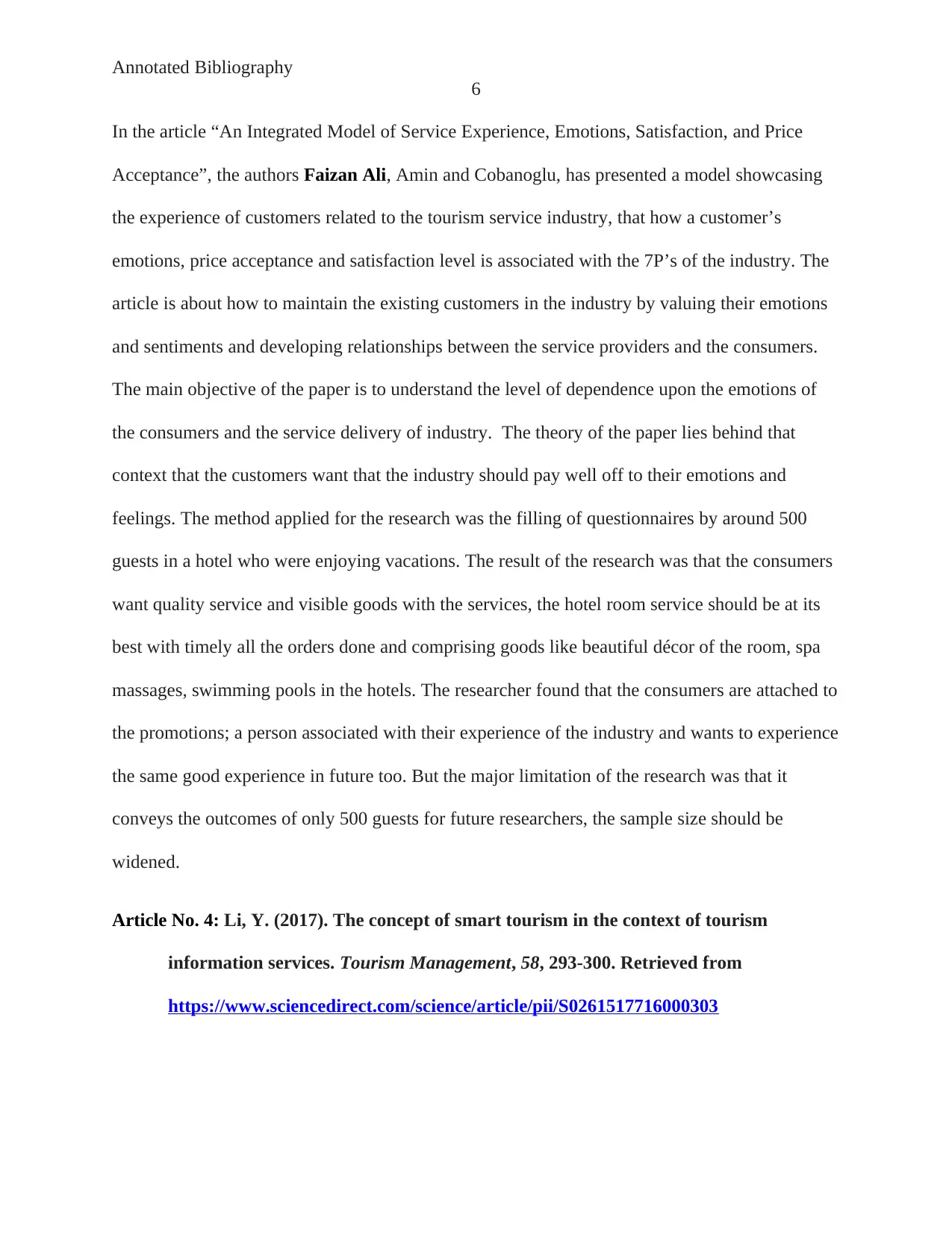
Annotated Bibliography
6
In the article “An Integrated Model of Service Experience, Emotions, Satisfaction, and Price
Acceptance”, the authors Faizan Ali, Amin and Cobanoglu, has presented a model showcasing
the experience of customers related to the tourism service industry, that how a customer’s
emotions, price acceptance and satisfaction level is associated with the 7P’s of the industry. The
article is about how to maintain the existing customers in the industry by valuing their emotions
and sentiments and developing relationships between the service providers and the consumers.
The main objective of the paper is to understand the level of dependence upon the emotions of
the consumers and the service delivery of industry. The theory of the paper lies behind that
context that the customers want that the industry should pay well off to their emotions and
feelings. The method applied for the research was the filling of questionnaires by around 500
guests in a hotel who were enjoying vacations. The result of the research was that the consumers
want quality service and visible goods with the services, the hotel room service should be at its
best with timely all the orders done and comprising goods like beautiful décor of the room, spa
massages, swimming pools in the hotels. The researcher found that the consumers are attached to
the promotions; a person associated with their experience of the industry and wants to experience
the same good experience in future too. But the major limitation of the research was that it
conveys the outcomes of only 500 guests for future researchers, the sample size should be
widened.
Article No. 4: Li, Y. (2017). The concept of smart tourism in the context of tourism
information services. Tourism Management, 58, 293-300. Retrieved from
https://www.sciencedirect.com/science/article/pii/S0261517716000303
6
In the article “An Integrated Model of Service Experience, Emotions, Satisfaction, and Price
Acceptance”, the authors Faizan Ali, Amin and Cobanoglu, has presented a model showcasing
the experience of customers related to the tourism service industry, that how a customer’s
emotions, price acceptance and satisfaction level is associated with the 7P’s of the industry. The
article is about how to maintain the existing customers in the industry by valuing their emotions
and sentiments and developing relationships between the service providers and the consumers.
The main objective of the paper is to understand the level of dependence upon the emotions of
the consumers and the service delivery of industry. The theory of the paper lies behind that
context that the customers want that the industry should pay well off to their emotions and
feelings. The method applied for the research was the filling of questionnaires by around 500
guests in a hotel who were enjoying vacations. The result of the research was that the consumers
want quality service and visible goods with the services, the hotel room service should be at its
best with timely all the orders done and comprising goods like beautiful décor of the room, spa
massages, swimming pools in the hotels. The researcher found that the consumers are attached to
the promotions; a person associated with their experience of the industry and wants to experience
the same good experience in future too. But the major limitation of the research was that it
conveys the outcomes of only 500 guests for future researchers, the sample size should be
widened.
Article No. 4: Li, Y. (2017). The concept of smart tourism in the context of tourism
information services. Tourism Management, 58, 293-300. Retrieved from
https://www.sciencedirect.com/science/article/pii/S0261517716000303
⊘ This is a preview!⊘
Do you want full access?
Subscribe today to unlock all pages.

Trusted by 1+ million students worldwide
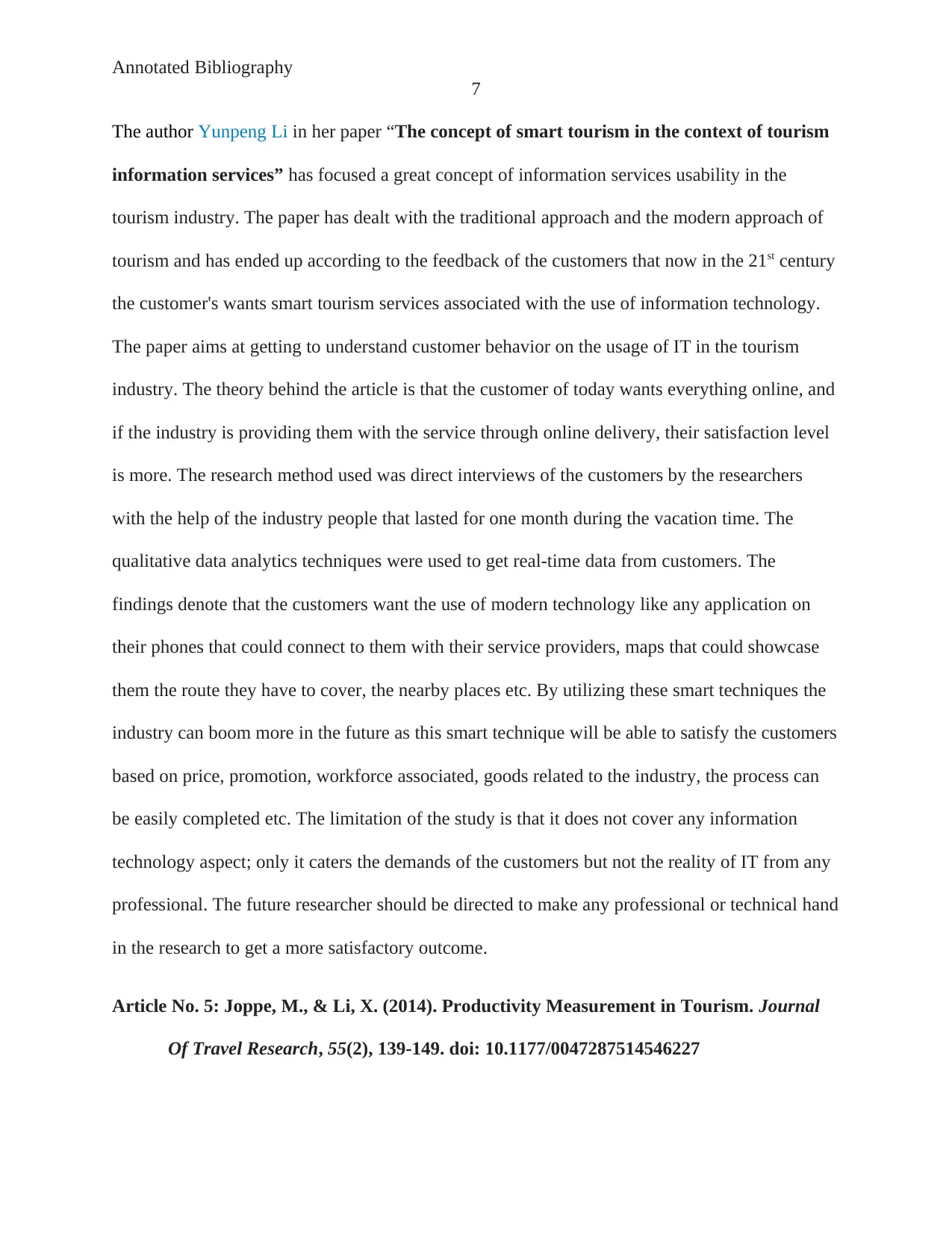
Annotated Bibliography
7
The author Yunpeng Li in her paper “The concept of smart tourism in the context of tourism
information services” has focused a great concept of information services usability in the
tourism industry. The paper has dealt with the traditional approach and the modern approach of
tourism and has ended up according to the feedback of the customers that now in the 21st century
the customer's wants smart tourism services associated with the use of information technology.
The paper aims at getting to understand customer behavior on the usage of IT in the tourism
industry. The theory behind the article is that the customer of today wants everything online, and
if the industry is providing them with the service through online delivery, their satisfaction level
is more. The research method used was direct interviews of the customers by the researchers
with the help of the industry people that lasted for one month during the vacation time. The
qualitative data analytics techniques were used to get real-time data from customers. The
findings denote that the customers want the use of modern technology like any application on
their phones that could connect to them with their service providers, maps that could showcase
them the route they have to cover, the nearby places etc. By utilizing these smart techniques the
industry can boom more in the future as this smart technique will be able to satisfy the customers
based on price, promotion, workforce associated, goods related to the industry, the process can
be easily completed etc. The limitation of the study is that it does not cover any information
technology aspect; only it caters the demands of the customers but not the reality of IT from any
professional. The future researcher should be directed to make any professional or technical hand
in the research to get a more satisfactory outcome.
Article No. 5: Joppe, M., & Li, X. (2014). Productivity Measurement in Tourism. Journal
Of Travel Research, 55(2), 139-149. doi: 10.1177/0047287514546227
7
The author Yunpeng Li in her paper “The concept of smart tourism in the context of tourism
information services” has focused a great concept of information services usability in the
tourism industry. The paper has dealt with the traditional approach and the modern approach of
tourism and has ended up according to the feedback of the customers that now in the 21st century
the customer's wants smart tourism services associated with the use of information technology.
The paper aims at getting to understand customer behavior on the usage of IT in the tourism
industry. The theory behind the article is that the customer of today wants everything online, and
if the industry is providing them with the service through online delivery, their satisfaction level
is more. The research method used was direct interviews of the customers by the researchers
with the help of the industry people that lasted for one month during the vacation time. The
qualitative data analytics techniques were used to get real-time data from customers. The
findings denote that the customers want the use of modern technology like any application on
their phones that could connect to them with their service providers, maps that could showcase
them the route they have to cover, the nearby places etc. By utilizing these smart techniques the
industry can boom more in the future as this smart technique will be able to satisfy the customers
based on price, promotion, workforce associated, goods related to the industry, the process can
be easily completed etc. The limitation of the study is that it does not cover any information
technology aspect; only it caters the demands of the customers but not the reality of IT from any
professional. The future researcher should be directed to make any professional or technical hand
in the research to get a more satisfactory outcome.
Article No. 5: Joppe, M., & Li, X. (2014). Productivity Measurement in Tourism. Journal
Of Travel Research, 55(2), 139-149. doi: 10.1177/0047287514546227
Paraphrase This Document
Need a fresh take? Get an instant paraphrase of this document with our AI Paraphraser
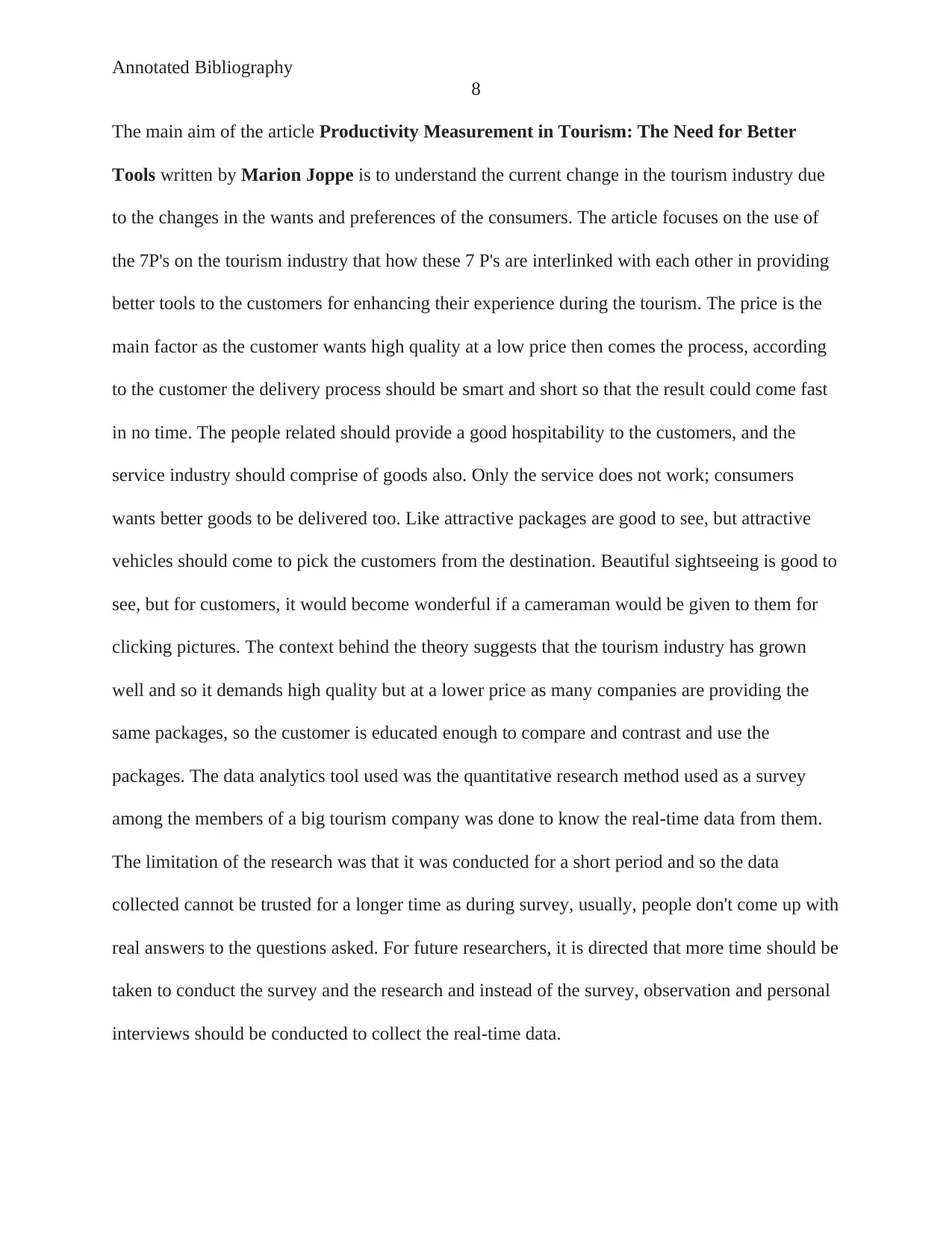
Annotated Bibliography
8
The main aim of the article Productivity Measurement in Tourism: The Need for Better
Tools written by Marion Joppe is to understand the current change in the tourism industry due
to the changes in the wants and preferences of the consumers. The article focuses on the use of
the 7P's on the tourism industry that how these 7 P's are interlinked with each other in providing
better tools to the customers for enhancing their experience during the tourism. The price is the
main factor as the customer wants high quality at a low price then comes the process, according
to the customer the delivery process should be smart and short so that the result could come fast
in no time. The people related should provide a good hospitability to the customers, and the
service industry should comprise of goods also. Only the service does not work; consumers
wants better goods to be delivered too. Like attractive packages are good to see, but attractive
vehicles should come to pick the customers from the destination. Beautiful sightseeing is good to
see, but for customers, it would become wonderful if a cameraman would be given to them for
clicking pictures. The context behind the theory suggests that the tourism industry has grown
well and so it demands high quality but at a lower price as many companies are providing the
same packages, so the customer is educated enough to compare and contrast and use the
packages. The data analytics tool used was the quantitative research method used as a survey
among the members of a big tourism company was done to know the real-time data from them.
The limitation of the research was that it was conducted for a short period and so the data
collected cannot be trusted for a longer time as during survey, usually, people don't come up with
real answers to the questions asked. For future researchers, it is directed that more time should be
taken to conduct the survey and the research and instead of the survey, observation and personal
interviews should be conducted to collect the real-time data.
8
The main aim of the article Productivity Measurement in Tourism: The Need for Better
Tools written by Marion Joppe is to understand the current change in the tourism industry due
to the changes in the wants and preferences of the consumers. The article focuses on the use of
the 7P's on the tourism industry that how these 7 P's are interlinked with each other in providing
better tools to the customers for enhancing their experience during the tourism. The price is the
main factor as the customer wants high quality at a low price then comes the process, according
to the customer the delivery process should be smart and short so that the result could come fast
in no time. The people related should provide a good hospitability to the customers, and the
service industry should comprise of goods also. Only the service does not work; consumers
wants better goods to be delivered too. Like attractive packages are good to see, but attractive
vehicles should come to pick the customers from the destination. Beautiful sightseeing is good to
see, but for customers, it would become wonderful if a cameraman would be given to them for
clicking pictures. The context behind the theory suggests that the tourism industry has grown
well and so it demands high quality but at a lower price as many companies are providing the
same packages, so the customer is educated enough to compare and contrast and use the
packages. The data analytics tool used was the quantitative research method used as a survey
among the members of a big tourism company was done to know the real-time data from them.
The limitation of the research was that it was conducted for a short period and so the data
collected cannot be trusted for a longer time as during survey, usually, people don't come up with
real answers to the questions asked. For future researchers, it is directed that more time should be
taken to conduct the survey and the research and instead of the survey, observation and personal
interviews should be conducted to collect the real-time data.
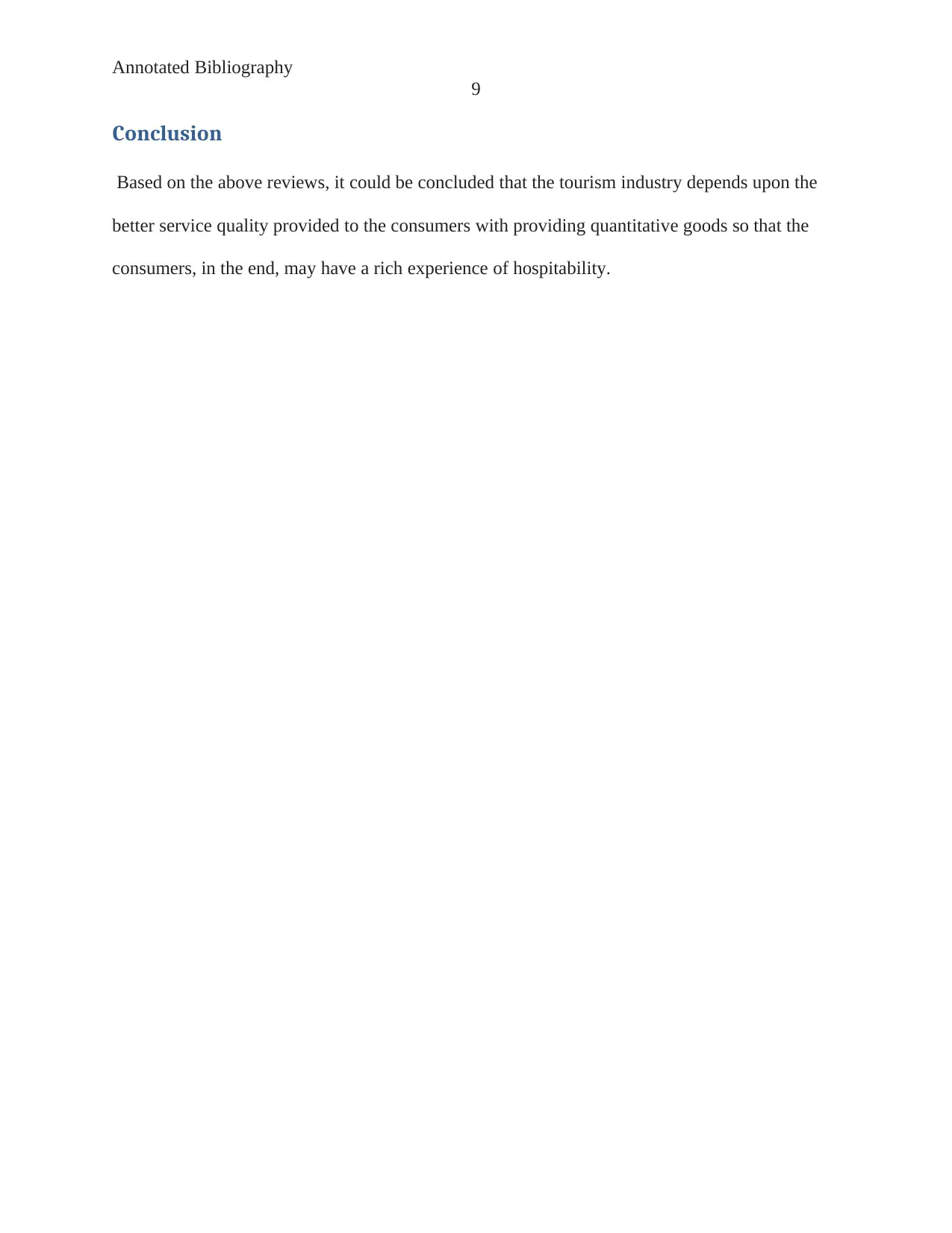
Annotated Bibliography
9
Conclusion
Based on the above reviews, it could be concluded that the tourism industry depends upon the
better service quality provided to the consumers with providing quantitative goods so that the
consumers, in the end, may have a rich experience of hospitability.
to annotated bibliographies
9
Conclusion
Based on the above reviews, it could be concluded that the tourism industry depends upon the
better service quality provided to the consumers with providing quantitative goods so that the
consumers, in the end, may have a rich experience of hospitability.
to annotated bibliographies
⊘ This is a preview!⊘
Do you want full access?
Subscribe today to unlock all pages.

Trusted by 1+ million students worldwide
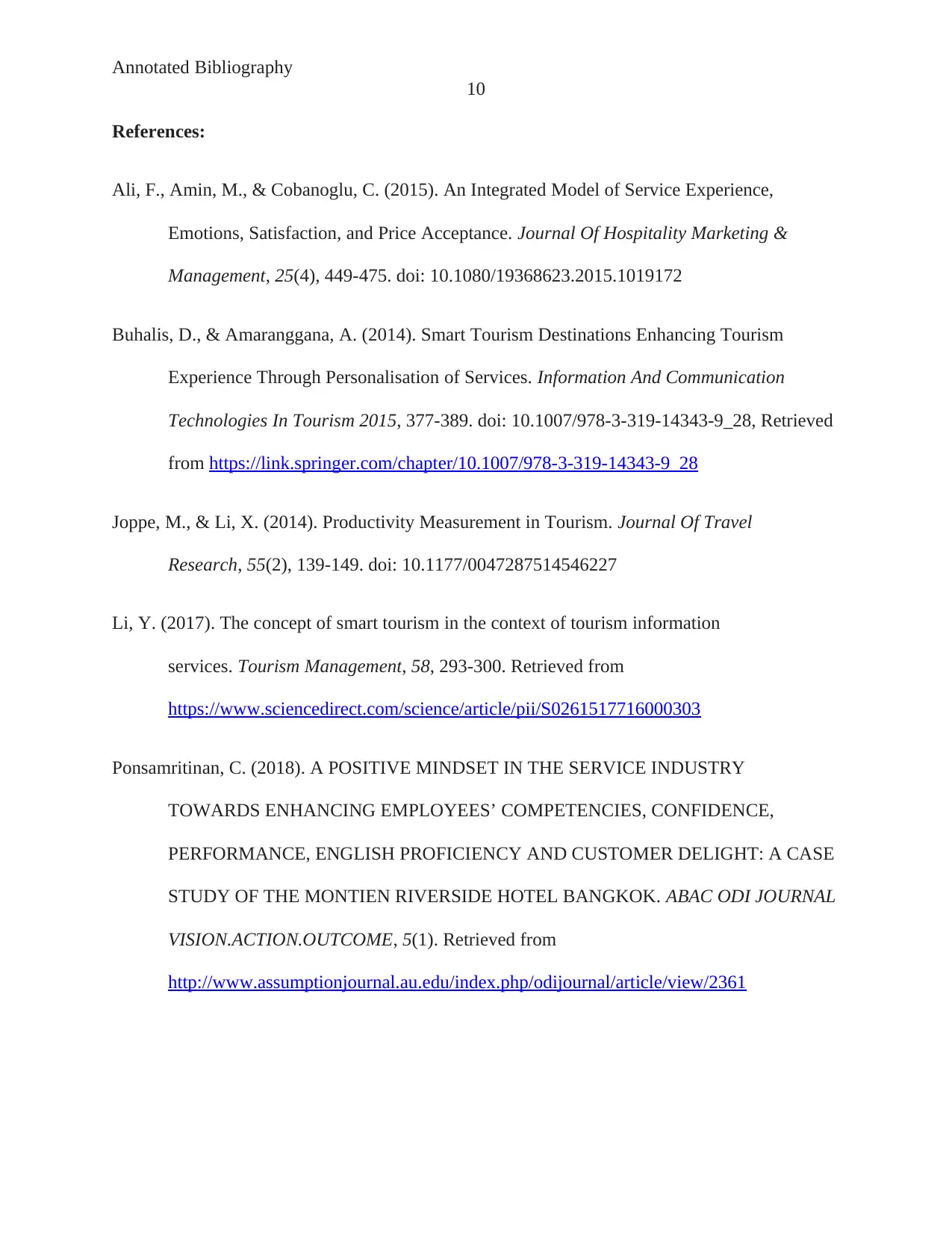
Annotated Bibliography
10
References:
Ali, F., Amin, M., & Cobanoglu, C. (2015). An Integrated Model of Service Experience,
Emotions, Satisfaction, and Price Acceptance. Journal Of Hospitality Marketing &
Management, 25(4), 449-475. doi: 10.1080/19368623.2015.1019172
Buhalis, D., & Amaranggana, A. (2014). Smart Tourism Destinations Enhancing Tourism
Experience Through Personalisation of Services. Information And Communication
Technologies In Tourism 2015, 377-389. doi: 10.1007/978-3-319-14343-9_28, Retrieved
from https://link.springer.com/chapter/10.1007/978-3-319-14343-9_28
Joppe, M., & Li, X. (2014). Productivity Measurement in Tourism. Journal Of Travel
Research, 55(2), 139-149. doi: 10.1177/0047287514546227
Li, Y. (2017). The concept of smart tourism in the context of tourism information
services. Tourism Management, 58, 293-300. Retrieved from
https://www.sciencedirect.com/science/article/pii/S0261517716000303
Ponsamritinan, C. (2018). A POSITIVE MINDSET IN THE SERVICE INDUSTRY
TOWARDS ENHANCING EMPLOYEES’ COMPETENCIES, CONFIDENCE,
PERFORMANCE, ENGLISH PROFICIENCY AND CUSTOMER DELIGHT: A CASE
STUDY OF THE MONTIEN RIVERSIDE HOTEL BANGKOK. ABAC ODI JOURNAL
VISION.ACTION.OUTCOME, 5(1). Retrieved from
http://www.assumptionjournal.au.edu/index.php/odijournal/article/view/2361
10
References:
Ali, F., Amin, M., & Cobanoglu, C. (2015). An Integrated Model of Service Experience,
Emotions, Satisfaction, and Price Acceptance. Journal Of Hospitality Marketing &
Management, 25(4), 449-475. doi: 10.1080/19368623.2015.1019172
Buhalis, D., & Amaranggana, A. (2014). Smart Tourism Destinations Enhancing Tourism
Experience Through Personalisation of Services. Information And Communication
Technologies In Tourism 2015, 377-389. doi: 10.1007/978-3-319-14343-9_28, Retrieved
from https://link.springer.com/chapter/10.1007/978-3-319-14343-9_28
Joppe, M., & Li, X. (2014). Productivity Measurement in Tourism. Journal Of Travel
Research, 55(2), 139-149. doi: 10.1177/0047287514546227
Li, Y. (2017). The concept of smart tourism in the context of tourism information
services. Tourism Management, 58, 293-300. Retrieved from
https://www.sciencedirect.com/science/article/pii/S0261517716000303
Ponsamritinan, C. (2018). A POSITIVE MINDSET IN THE SERVICE INDUSTRY
TOWARDS ENHANCING EMPLOYEES’ COMPETENCIES, CONFIDENCE,
PERFORMANCE, ENGLISH PROFICIENCY AND CUSTOMER DELIGHT: A CASE
STUDY OF THE MONTIEN RIVERSIDE HOTEL BANGKOK. ABAC ODI JOURNAL
VISION.ACTION.OUTCOME, 5(1). Retrieved from
http://www.assumptionjournal.au.edu/index.php/odijournal/article/view/2361
1 out of 10
Your All-in-One AI-Powered Toolkit for Academic Success.
+13062052269
info@desklib.com
Available 24*7 on WhatsApp / Email
![[object Object]](/_next/static/media/star-bottom.7253800d.svg)
Unlock your academic potential
Copyright © 2020–2026 A2Z Services. All Rights Reserved. Developed and managed by ZUCOL.


